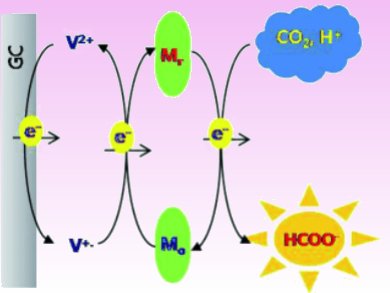Carbon dioxide conversion is not only important because it removes a greenhouse gas, but because it enables the use of the most-abundant carbon compound for producing useful organic compounds. The conversion of CO2 into formate by two acetogenic bacteria, Moorella thermoacetica (Mt) and Clostridium formicoaceticum (Cf), has been reported by Woonsup Shin and colleagues, Sogang University, Korea.
An electric current is applied to a solution of the bacteria and methyl viologen. The current provides electrons for the reduction of CO2, which is performed by the bacteria at 55 °C and pH 7. Methyl viologen acts as an electron shuttle as the bacterial cells in solution do not communicate with the electrode directly (see picture).
Formate was detected as the major product, at a current efficiency of 80 % for Mt and 100 % for Cf upon electrolysis in 1 atm CO2-saturated solution, making these bacteria a green alternative to more traditional inorganic electrocatalysts.
- Microbes as Electrochemical CO2 Conversion Catalysts
J. Song, Y. Kim, M. Lim, H. Lee, J. I. Lee, W. Shin,
ChemSusChem 2011.
DOI: 10.1002/cssc.201100107




